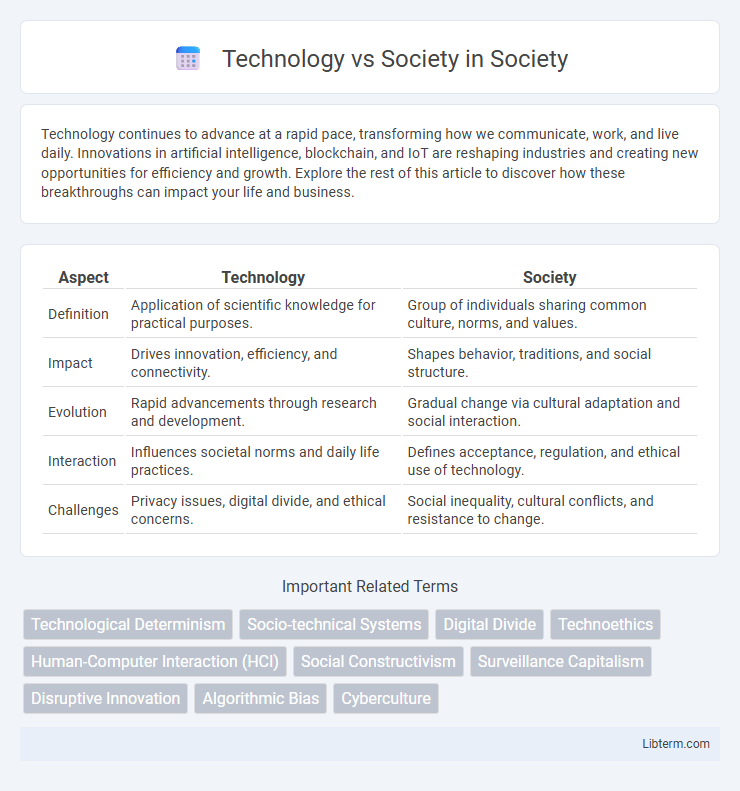Technology continues to advance at a rapid pace, transforming how we communicate, work, and live daily. Innovations in artificial intelligence, blockchain, and IoT are reshaping industries and creating new opportunities for efficiency and growth. Explore the rest of this article to discover how these breakthroughs can impact your life and business.
Table of Comparison
| Aspect | Technology | Society |
|---|---|---|
| Definition | Application of scientific knowledge for practical purposes. | Group of individuals sharing common culture, norms, and values. |
| Impact | Drives innovation, efficiency, and connectivity. | Shapes behavior, traditions, and social structure. |
| Evolution | Rapid advancements through research and development. | Gradual change via cultural adaptation and social interaction. |
| Interaction | Influences societal norms and daily life practices. | Defines acceptance, regulation, and ethical use of technology. |
| Challenges | Privacy issues, digital divide, and ethical concerns. | Social inequality, cultural conflicts, and resistance to change. |
The Evolution of Technology and Its Social Impact
The evolution of technology has dramatically reshaped societal structures, with advancements in artificial intelligence, communication networks, and automation transforming how individuals interact and economic systems operate. Innovations such as the internet and smartphones have accelerated information exchange and connectivity, influencing cultural norms and social behaviors globally. These technological shifts prompt ongoing debates about privacy, employment, and digital inclusion, highlighting the need for adaptive policies that balance progress with societal well-being.
How Technology Shapes Human Behavior
Technology profoundly influences human behavior by altering communication patterns, social interactions, and decision-making processes. Digital platforms and algorithms shape preferences, reinforce habits, and impact cognitive functions, while pervasive connectivity modifies attention spans and social norms. As technology evolves, it redefines identity, privacy expectations, and the way individuals engage with the world around them.
Digital Divide: Bridging Gaps or Deepening Inequality?
The digital divide exacerbates social inequality by limiting access to technology for marginalized communities, hindering educational and economic opportunities. Efforts to bridge this gap through affordable internet, digital literacy programs, and inclusive technology policies are crucial in promoting equitable participation in the digital economy. Addressing infrastructure disparities and ensuring widespread access to digital tools can transform technology from a source of division into a catalyst for social empowerment.
Privacy Concerns in a Connected World
The rapid expansion of the Internet of Things and pervasive data collection has intensified privacy concerns in a connected world. Advanced technologies such as AI-powered surveillance, facial recognition, and big data analytics challenge traditional notions of personal privacy and data ownership. Regulatory frameworks like GDPR and CCPA aim to protect user data, but ongoing innovation demands continuous adaptation to balance technological benefits with societal privacy rights.
The Influence of Social Media on Society
Social media platforms have fundamentally transformed communication patterns, enabling instant connectivity and information exchange on a global scale. The pervasive use of social media affects societal norms, influencing behaviors, public opinion, and even political mobilization through viral content and targeted advertising. However, these platforms also contribute to issues such as misinformation spread, privacy concerns, and mental health challenges, highlighting a complex relationship between technology and social dynamics.
Technology’s Role in Education and Learning
Technology transforms education by enabling personalized learning through adaptive algorithms and interactive digital tools, enhancing student engagement and comprehension. Online platforms and virtual classrooms expand access to quality education globally, bridging gaps in geography and socioeconomic status. Data analytics in education allows educators to track progress and tailor instruction, fostering more effective and inclusive learning environments.
Automation, Jobs, and the Future of Work
Automation is transforming society by reshaping job markets and redefining workforce dynamics, with artificial intelligence and robotics driving efficiency in manufacturing, logistics, and service industries. This technological evolution challenges employment patterns, necessitating reskilling and adaptation to new roles that emphasize creativity, problem-solving, and digital literacy. The future of work hinges on the balance between technological advancements and societal policies that support inclusive economic growth and workforce transition.
Ethical Dilemmas in Technological Advancements
Technological advancements frequently pose complex ethical dilemmas, challenging societal norms and values surrounding privacy, autonomy, and equity. Issues such as data surveillance, AI bias, and genetic modification raise questions about consent, fairness, and long-term impacts on human rights. Societies must balance innovation with ethical frameworks to ensure responsible development and mitigate potential harms.
Balancing Innovation with Social Responsibility
Balancing innovation with social responsibility requires integrating ethical considerations into technology development to mitigate negative societal impacts like privacy invasion and job displacement. Prioritizing transparency, inclusivity, and equitable access ensures that technological advancements benefit diverse communities while fostering public trust. Regulatory frameworks and corporate accountability mechanisms play critical roles in aligning technological progress with societal well-being.
Building a Harmonious Future: Technology and Society
Technology and society must evolve together to build a harmonious future where innovation enhances human well-being and social equity. Integrating artificial intelligence, renewable energy, and digital connectivity fosters sustainable development while addressing ethical considerations and digital divides. Collaborative efforts between policymakers, technologists, and communities ensure technology supports cultural values and promotes inclusive growth.
Technology Infographic

 libterm.com
libterm.com